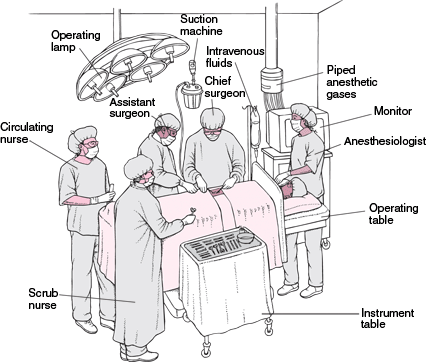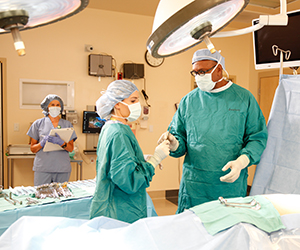Explore web search results related to this domain and discover relevant information.
During a case, they’ll grab additional supplies as needed and help out the surgical team, who cannot leave the sterile field. Toward the end of the case, they’ll ensure an accurate count of sutures, needles, sponges, and lap pads. You don’t want to accidentally leave a sponge or needle ...
During a case, they’ll grab additional supplies as needed and help out the surgical team, who cannot leave the sterile field. Toward the end of the case, they’ll ensure an accurate count of sutures, needles, sponges, and lap pads. You don’t want to accidentally leave a sponge or needle in a patient—and yes, it happens.In addition to the core team, you’ll often see medical students or residents in surgical cases at teaching hospitals. Junior medical students generally observe, doing their best to stay out of the way and, of course, not contaminate the sterile field.The PACU or recovery room nurse accepts the patient from the OR and provides a secure environment for recovery. There may be additional team members in the OR, depending on the case or the institution.Together, all parts working in harmony translate to a successful and nearly seamless experience for the patient. It’s not about you or your ego or who said what or whose toes were stepped on. And at the end of the day, it’s all about the patient. Which surgical team role most resonates with you?


Even “tomorrow” is too vague for us to have much of a chance to end up in the same place at the same time. Teams need a lot of precision to keep from coming apart at the seams. They need members to have a clear, vivid, shared vision of the future, like “Put a man on the moon” or “A ...
Even “tomorrow” is too vague for us to have much of a chance to end up in the same place at the same time. Teams need a lot of precision to keep from coming apart at the seams. They need members to have a clear, vivid, shared vision of the future, like “Put a man on the moon” or “A computer on every desk, in every home.”They found that motivation isn’t just a function of traits, rewards, or a boss hollering at you. Instead, it’s the task itself that matters most. For instance, teams are more motivated when they are seen as important, demand a variety of skills, and provide feedback as the work is being done.Team members need to have the knowledge and skills to complete the work. And, it helps when members have diverse knowledge, skills, and perspectives. But one of the biggest mistakes in modern organizations isn’t about members’ abilities—it is about size.When you focus on these conditions, you give your teams a chance to become more than the sum of their parts. ... Carton, A. M. (2017). “I’m Not Mopping the Floors, I’m Putting a Man on the Moon”: How NASA Leaders Enhanced the Meaningfulness of Work by Changing the Meaning of Work. Administrative Science Quarterly, 62(2), 323–369. https://doi.org/10.1177/0001839217713748

When you have surgery, a team of medical staff helps the surgeon during the operation. Who is on the team depends on the type of surgery. Most teams include the following providers. A surgeon has finished 4 years of medical school and 4 or more years of special training (residency) after medical ...
When you have surgery, a team of medical staff helps the surgeon during the operation. Who is on the team depends on the type of surgery. Most teams include the following providers. A surgeon has finished 4 years of medical school and 4 or more years of special training (residency) after medical school.In many teaching hospitals, resident providers in training and medical students may be a part of the surgical team. Physician assistants (PAs) practice medicine under the supervision of a licensed healthcare provider in most states. They may act as an assistant to the surgeon and do things like close incisions with stitches (sutures) or staples.The surgical team is made up of a surgeon, an anesthesiologist, a certified registered nurse anesthetist, and an operating room nurse.An anesthesiologist has finished 4 years of medical school and 4 years of special training in anesthesia. They may get more training in certain surgery specialties. This might be neurosurgical anesthesia or cardiac anesthesia.
When prompted during setup or first use, select a login method. If you're already logged in to Claude Code via a different account, run /login to select a different login method. Select “Claude account with subscription” to be routed to an OAuth prompt. Select your Team or Enterprise plan ...
When prompted during setup or first use, select a login method. If you're already logged in to Claude Code via a different account, run /login to select a different login method. Select “Claude account with subscription” to be routed to an OAuth prompt. Select your Team or Enterprise plan and click “Authorize.”Claude Code is only available to members of Team and Enterprise organizations assigned to premium seats.Team or Enterprise plan Owners and Primary Owners can purchase premium seats that include Claude Code access and manage seat allocation in Settings > Members.If you’re on an Enterprise plan and looking for more specific information about usage limits, please reach out to your Account Manager or our Sales team.

Microsoft shared details of its Teams-less pricing in 2023, confirming the packages would cost €2/month or €24/year less in the EEA and Switzerland.
However, Teams would be available as a standalone package for €5/month or €60/year, resulting in a higher overall cost and rendering Europe’s ruling largely ineffective.Pro Good news for careless clickers - Microsoft Teams is upping its protection against dangerous scams · Pro Bad news Microsoft workers - tech giant is "considering" remote working crackdown, and employees could be ordered back to the office soon"We're done" - major government organization slams Microsoft Teams as it drops Windows for goodMicrosoftTeams approaches end of five-year European battle
When you have surgery, a team of medical staff helps the surgeon during the operation. Who is on the team depends on the type of surgery. Most teams include the following providers. A surgeon has finished 4 years of medical school and 4 or more years of special training (residency) after medical ...
When you have surgery, a team of medical staff helps the surgeon during the operation. Who is on the team depends on the type of surgery. Most teams include the following providers. A surgeon has finished 4 years of medical school and 4 or more years of special training (residency) after medical school.In many teaching hospitals, resident providers in training and medical students may be a part of the surgical team. Physician assistants (PAs) practice medicine under the supervision of a licensed healthcare provider in most states. They may act as an assistant to the surgeon and do things like close incisions with stitches (sutures) or staples.An anesthesiologist has finished 4 years of medical school and 4 years of special training in anesthesia. They may get more training in certain surgery specialties. This might be neurosurgical anesthesia or cardiac anesthesia.A nurse anesthetist gives you anesthesia care before, during, and after surgery or labor and delivery. The nurse constantly watches every important function of your body. They can change the anesthesia medicine to make sure you are safe and comfortable. A nurse anesthetist has a bachelor's degree in nursing and at least 1 year of experience as a registered nurse in a critical-care setting.
Operating Room Team When a patient is about to undergo a surgical procedure direct patient care will be pass on to the operating room personnel. The operating room (OR) team is responsible for the well-being of a patient throughout the operation. This team should not only consider the patient’s ...
Operating Room Team When a patient is about to undergo a surgical procedure direct patient care will be pass on to the operating room personnel. The operating room (OR) team is responsible for the well-being of a patient throughout the operation. This team should not only consider the patient’s privacy but will also promote safety measures for the patient.As described, the OR team is similar to that of a symphony orchestra. There are many members in an orchestra but they work together in unison and harmony to create a superb outcome. The operating room (OR) team does the same thing.Patients undergoing surgery will be taken care of the operating room team. Safety and privacy of patients in the OR is safeguarded by the operating room team members. Personnel inside the OR consist of the operating surgeon, assistants to the surgeon, a scrub person, an anesthesiologist and a circulating nurse.The team is divided into two divisions according to the function of its members. Sterile OR team: operating surgeon, assistants to the surgeon and scrub person


A group is a collection of individuals who coordinate their efforts, while a team is a group of people who share a common purpose. In order to improve working relationships, it's important to understand the differences between the two to encourage healthy working dynamics.
On the other hand, in a team, team members share a mutual accountability and work closely together to solve problems. These dynamics inform the way tasks are handled and overall collaboration. In short, a group is a number of people who work together. They have individual goals that they work toward collectively. While groups work toward separate goals, they have a related interest or identity that brings them together.Groups build temporary relationships: Since groups focus on individual members working in parallel to one another, they build temporary working relationships such as short-term external projects or temporary internal consulting. Groups are great for efficiency: While teams work to create efficiency for the greater good, groups focus on individual efficiency.Groups can alienate individuals: Since groups work individually, there isn’t as much time spent on team building. This lack of teamwork can alienate individuals and cause communication issues. Groups don’t support organizational goals: Likewise, this lack of teamwork can cause a gap in organizational clarity.Working in a team environment has many advantages that all come back to working toward the same goals and supporting members in a shared experience. Many organizations work in a team setting vs. a group setting as they prefer the advantages of collaboration.
OR leaders spend much of their day ensuring the surgery schedule runs smoothly, a task that depends on the teams within each of the ORs. Highly functioning teams produce optimal results, including good patient outcomes, satisfied surgeons, and efficient use of resources.
But developing a highly functional team with good synergy can be challenging, particularly as new staff are added into the mix. A new tool can help OR leaders meet that challenge. ExplORer Surgical is an interactive surgical playbook that promotes teamwork.The playbook displays on a tablet the specific, role-based information that each member of the OR team needs to know, and a master display shows items of interest to the entire team, such as the overall progress of the case.OR Manager spoke with Dr Stefanidis and two nurse leaders at IU Health North Hospital in Carmel, Indiana, where a study of ExplORer Surgical is being conducted to gain a better understanding of its potential in the OR, including the effects on team function and patient outcomes.Common sources of delays in the OR are lack of the right supplies because of outdated preference cards and new staff uncertainty about next steps in a procedure. ExplORer Surgical incorporates the surgeon’s and anesthesiologist’s preferences and protocols for a procedure and provides role-specific information for each step of the case to each surgical team member.


The feud between the Lakers' LeBron James and ESPN's Stephen A. Smith has some people taking sides. Here's what Charles Barkley, Adam Silver and others had to say after a heated week.
In January, Smith used his platform as an ESPN host to issue an on-air appeal to the Lakers superstar about his son and Lakers teammate Bronny James: “I am pleading with LeBron James as a father: Stop this,. ...Get the latest on L.A.'s teams in the daily Sports Report newsletter.Chuck Schilken is a sports reporter on the Fast Break team. He spent more than 18 years with the Los Angeles Times’ Sports Department in a variety of roles.The NBA commissioner was asked about the situation while speaking to reporters following a two-day Board of Governors meeting in New York. Silver didn’t mention James or Smith by name and didn’t take sides but did acknowledge “I particularly feel protective of our players.”

Leaders intentionally build Trust and relationships that cut across silos; align everyone to a Common Purpose so teams understand the "why” behind decisions; cultivate Shared Consciousness throughout organizational networks; and enable Empowered Execution by pushing authority and decisions ...
Leaders intentionally build Trust and relationships that cut across silos; align everyone to a Common Purpose so teams understand the "why” behind decisions; cultivate Shared Consciousness throughout organizational networks; and enable Empowered Execution by pushing authority and decisions to the edge.Since its publication, the applications of Team of Teams have continued to grow. McChrystal Group has guided organizations in implementing these principles in areas such as AI integration, digital transformation, HR lifecycle development, integrating new teams or function, and more-helping leaders adapt more quickly, align strategy with execution, and drive results in complex environments.Team of Teams has become a blueprint for senior leaders facing unprecedented disruption. From Fortune 100 companies adapting to digital transformation to public agencies coordinating large-scale crisis response, organizations across industries have leveraged the framework to break down silos, build shared consciousness, and unlock empowered execution.To mark this milestone, McChrystal Group has launched TeamOfTeams.Online, a platform designed for senior leaders. The site provides practical tools, case studies, and leadership insights to help organizations flatten hierarchy, accelerate execution, and achieve strategic objectives in fast-changing environments.

OKRs have become a popular way to connect strategy with execution in large organizations. But when they are set in a top‑down cascade, they often lose their meaning. Teams receive objectives they didn’t help create, and the result is weak commitment and little real change.
Paulo Caroli helps teams and organizations bridge the gap between strategy and delivery. With a background in software engineering and decades of experience facilitating agile transformations, he is known for practical approaches that drive alignment and real results.Each chapter ends with actionable takeaways, and the book explores advanced topics such as shared OKRs, mission teams, and ways to adapt the OKR cycle in more complex environments. OKRs—Objectives and Key Results—have become a popular goal-setting framework in tech and beyond. They were designed to bridge the gap between strategy and execution, promising focus, alignment, and accountability. But too often, they’ve turned into something else entirely: a quarterly ritual of checklists, dashboards, and performance metrics that smother the original intent.It’s about the teams that break that pattern—the ones that use OKRs not as a management tool, but as a way to own outcomes, align with strategy, and deliver real results in the messy, wonderful reality of building products and serving customers. OKRs are everywhere. From startups to large enterprises, they show up in kickoff meetings, dashboards, and strategy documents. But in many organizations I’ve worked with, OKRs rarely change how teams actually work—or deliver.Sometimes these OKRs are nothing more than KPIs with new labels. Other times, they’re vague slogans—disconnected from real work. Either way, the result is the same: teams don’t own the goals. Without ownership, they comply at best—or disengage entirely.
The operating room (OR) is a high-stakes, collaborative environment where precision and teamwork are essential for successful surgeries. Each member of the surgical team plays a critical role in ensuring that procedures are performed safely and effectively.
We will explore the different roles in an OR and how they work together for a successful surgery. The surgeon is the leader of the surgical team, responsible for performing the procedure. They make critical decisions during the operation and ensure that everything is proceeding as planned.With Surgical Technologist: The surgical nurse and technologist work together to set up the OR, prepare instruments, and maintain sterility throughout the procedure. They coordinate tasks to ensure everything runs smoothly. Surgical technologists, also known as scrub techs, are integral members of the surgical team.Before surgery, surgical technologists prepare the OR by sterilizing equipment and setting up instruments. They ensure that all necessary supplies are available and organized for the procedure. During surgery, they hand instruments to the surgeon, maintain a sterile environment, and anticipate the needs of the surgical team.With Other OR Staff: The surgical technologist interacts with the circulating nurse and OR coordinator to ensure that all equipment and supplies are available while promptly addressing any issues. They play a key role in maintaining communication and efficiency within the OR. The role of the surgical technologist is vital in coordinating the surgical team and equipment.


The Australian relay team is a team of specialists. When the starters gun fires, there is no discussion about who does what or what level of performance is needed, they simply deliver their very best. There is only flawless, rehearsed, and precisely coordinated execution.
In media operations, we often focus on big, transformative changes while overlooking the power of incremental improvement, the 1%ers. What if we applied the marginal gains mindset, practiced by an Olympic swim team, to our workflows, such as slightly more efficient briefing template, or a marginally better handover process, or just a small improvement in resource allocation.To be clear, this op-ed doesn't advocate for budgie smugglers and swimming caps in the office.In my 30 plus years in this industry, I’ve observed the highest-performing teams aren’t necessarily those with the most talent, but those with the clearest understanding of what their individual contribution needs to look like and what they need to do to set up their teammates for success.As Cate Campbell once explained: “We practice these changeovers relentlessly. It’s about trust knowing exactly when your teammate will touch so you can time your dive perfectly. Too early and you’re disqualified; too late and you lose precious time.
The Operating Room Nurse Orthopedic Team Leader is responsible for the daily function in the Orthopedic Operating Room.
You will lead the team briefings, assigns tasks to and support the nursing staff, and assist the Anesthesia staff in the Orthopedic Operating Room.You will work together with the Orthopedic surgeons, the Operating Room Clinical Supervisor and Operating Room Manager to coordinate the weekly and daily Orthopedic surgery schedule.• Coordinate the daily functions of the Orthopedic program in the Operating Room, maintaining an efficient turnover• Knowledge of Orthopedic surgeries; knowledge and skills with orthopedic specialized equipment and implants

A dedicated operating team is defined as a surgical team consisting of the same group of people working together over time, optimally attuned in both technical and/or communicative aspects. This can be achieved through technical and/or communicative ...
This is an Open Access article distributed under the terms of the Creative Commons Attribution License (https://creativecommons.org/licenses/by/4.0/), which permits unrestricted reuse, distribution, and reproduction in any medium, provided the original work is properly cited. ... A dedicated operating team is defined as a surgical team consisting of the same group of people working together over time, optimally attuned in both technical and/or communicative aspects.The institution of surgical teams who followed communicative and/or technical training appeared to have beneficial effects on several clinical outcome measures. Dedicated teams provide a feasible way of improving healthcare quality and patient safety. A dose–response effect of team training was reported, but also a relapse rate, suggesting that repetitive training is of major concern to high-quality patient care.Increasing complexity of surgical procedures and eligible patient populations has led to medical specialists super specializing within their field of expertise. This extensive specialization is not always matched by other members of the operating room (OR) team, i.e.When there is a progressive mismatch between super specialists and generalists within one team, it is at risk of communication problems, mismatch of perioperative expectations and non-alignment of the appreciation of the perioperative risk. It seems straightforward that a dedicated surgical team, trained in technical and/or nontechnical skills concerning an intervention, could improve the efficiency, quality and safety of healthcare.

Adjectives for team: captain, building, concept, work, approach, divisions, division, sports, honors, coach
'team' Rhymes 517 · Near Rhymes 0 · Advanced View 176 · Related Words 261 · Descriptive Words 135 · Homophones 1 · Same Consonant 12 · Similar Sound 33 · Compiled automatically from published text to show frequent word combinations. Read More Results may indicate historical usage, and do not reflect the views of Merriam-Webster.
Have you ever been curious about the team of people in an operating room? What do they do? And why are there so many? Whether you’re scheduled for surgery, exploring a career in surgery, or just looking to brush up your trivia knowledge, this blog has your answers!
They promote patient safety and well-being of the patient and surgical team throughout the procedure. Circulating Nurses are licensed by the State of Michigan. A certified clinician providing technical support to the surgeon, registered nurse, and anesthesiologist in the operating room. Surgical technologists are responsible for preparing surgical equipment prior to the procedure. CSTs create and maintain the sterile surgical field. They pass sterile instruments, implants, and medications to the surgeon, PA, or CSFA in a safe and sterile fashion.OR Technicians are trained to provide support to the OR team, ensuring that surgical procedures run smoothly and efficiently.Have you ever been curious about the surgery team roles in an operating room? In this blog we break down each position for you!An advanced practice provider who assumes a variety of roles from admission to discharge. Before surgery, the PA may see the patient in the surgeon’s clinic, obtain the patient’s history and physical, perform a presurgical assessment, order diagnostic testing, and provide education related to the surgical procedure.

Researchers investigated perceptions of communication between members of the OR team.
But in the field of medicine, as Makary and colleagues note in “Operating Room Teamwork among Physicians and Nurses: Teamwork in the Eye of the Beholder,” teamwork is not just a buzzword or fuzzy concept [1]. Rather, it “is an integral component of a culture…and, accordingly, is an important surrogate of patient safety” [2]. Makary et al.In 1998, the Joint Commission on Accreditation of Healthcare Organizations (JCAHO) identified “breakdowns in communication as the leading root cause of wrong-site operations, and other sentinel events” [2]. To help correct this problem, JCAHO and the Institute of Medicine recommended that hospitals “promote effective team functioning” and “measure culture” [2]. No specific tool has been designed to achieve these goals in the OR.Makary and colleagues set out “to measure teamwork in the surgical setting…to compare ratings of teamwork within and between OR caregivers” [3]. Using the Intensive Care Unit Management Attitude Questionnaire as a template, the authors created the Safety Attitudes Questionnaire.Particularly interested in the ratings that OR staff members gave each other, the authors asked responders to describe on a scale of 1 (very low) to 5 (very high) the quality of communication and collaboration they had experienced with surgeons, anesthesiologists, surgical technicians, certified registered nurse anesthetists and OR nurses [3]. The survey was sent to all OR staff of Catholic health systems in 16 states (for a total of 60 hospitals) and had a response rate of 71 percent, with 79 percent of nurses returning the completed survey, and 67 percent of certified nurse anesthetists participating. The other disciplines fell between these two percentages. The survey results showed a major difference between physicians’ and nonphysicians’ perception of teamwork.
When you have surgery, a team of medical staff helps the surgeon during the operation. Who is on the team depends on the type of surgery. Most teams include the following providers. A surgeon has finished 4 years of medical school and 4 or more years of special training (residency) after medical ...
When you have surgery, a team of medical staff helps the surgeon during the operation. Who is on the team depends on the type of surgery. Most teams include the following providers. A surgeon has finished 4 years of medical school and 4 or more years of special training (residency) after medical school.In many teaching hospitals, resident providers in training and medical students may be a part of the surgical team. Physician assistants (PAs) practice medicine under the supervision of a licensed healthcare provider in most states. They may act as an assistant to the surgeon and do things like close incisions with stitches (sutures) or staples.The surgical team is made up of a surgeon, an anesthesiologist, a certified registered nurse anesthetist, and an operating room nurse.An anesthesiologist has finished 4 years of medical school and 4 years of special training in anesthesia. They may get more training in certain surgery specialties. This might be neurosurgical anesthesia or cardiac anesthesia.







